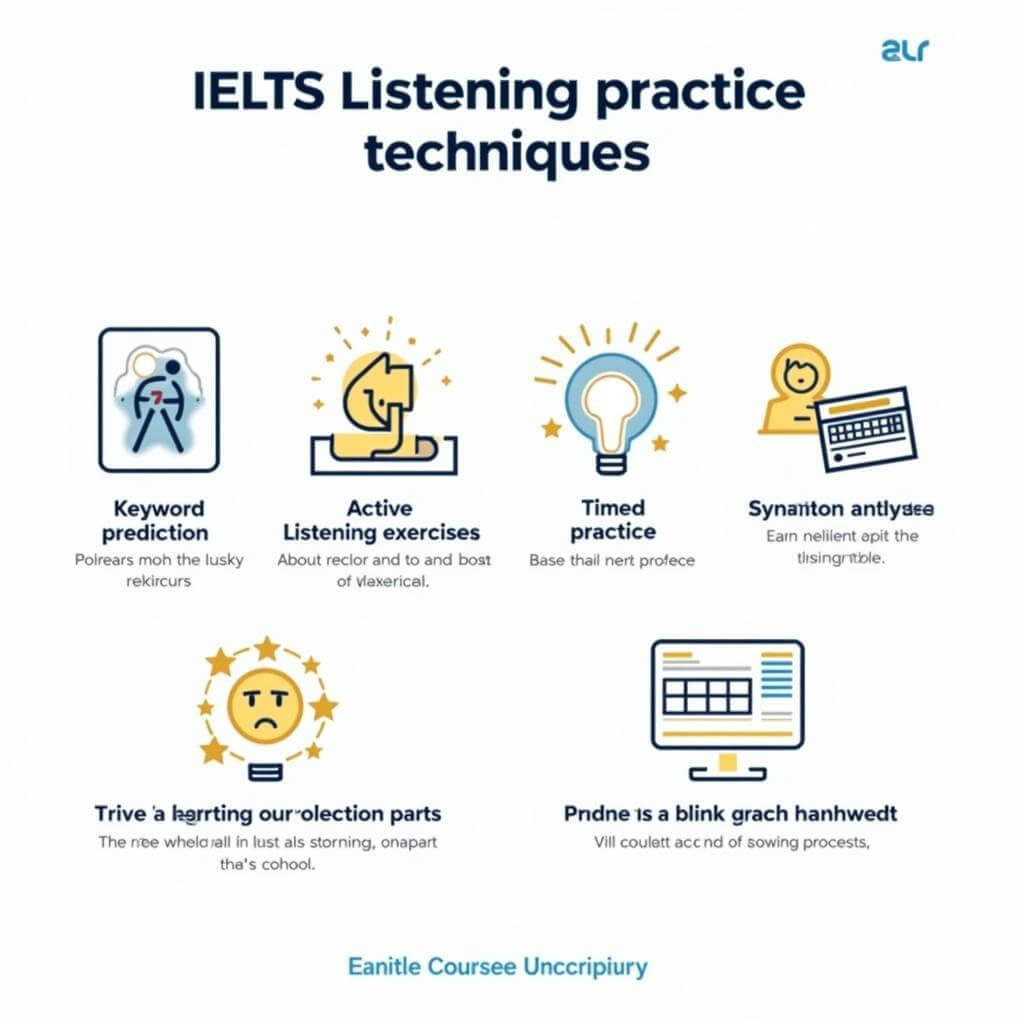In the IELTS Listening test, the ability to focus on specific keywords is a crucial skill that can significantly impact your performance. This technique not only helps you navigate through the audio more efficiently but also enhances your accuracy in answering questions. Let’s explore how you can master this essential strategy to boost your IELTS Listening score.
Understanding the Importance of Keyword Focus
Focusing on specific keywords during the IELTS Listening test is like having a compass in a sea of information. It guides your attention to the most relevant parts of the audio, helping you filter out unnecessary details and concentrate on what truly matters for answering the questions correctly.
Strategies for listening under pressure can be significantly improved by honing your keyword focus skills. This approach allows you to maintain clarity and precision even when faced with challenging audio passages or time constraints.
How Keyword Focus Works in IELTS Listening
When you focus on specific keywords, you’re essentially priming your brain to detect certain pieces of information. This selective attention helps you:
- Identify key information quickly
- Reduce cognitive load by filtering out irrelevant details
- Improve your ability to predict upcoming information
- Enhance your overall comprehension of the audio
Examples of Keyword Focus in Action
Let’s look at some examples to illustrate how focusing on specific keywords can help you in different sections of the IELTS Listening test:
- “The event will take place on July 15th at 7 PM.”
- Keywords: July 15th, 7 PM
- “Dr. Smith’s office is located in Room 305 of the Anderson Building.”
- Keywords: Room 305, Anderson Building
- “The project deadline has been extended to next Friday.”
- Keywords: deadline, next Friday
- “Please bring your passport and two recent photographs for registration.”
- Keywords: passport, two recent photographs
- “The total cost of the course is £1,500, including materials and exam fees.”
- Keywords: £1,500, materials, exam fees
Applying Keyword Focus to IELTS Listening Questions
Now, let’s see how you can apply this technique to actual IELTS Listening questions:
Multiple Choice Questions
For multiple choice questions, identify the keywords in the question stem and options. Listen for synonyms or paraphrases of these keywords in the audio.
Example:
Question: What is the main topic of the lecture?
A) Climate change
B) Renewable energy
C) Urban planning
Keywords to focus on: climate change, renewable energy, urban planning
Form Completion
In form completion tasks, the keywords are often the labels or categories on the form. Pay attention to these words and listen for related information.
Example:
Name:
Date of birth:
Occupation: ___
Keywords to focus on: name, date of birth, occupation
Short Answer Questions
For short answer questions, the keywords are typically found in the question itself. Focus on these words to anticipate the type of information you need to listen for.
Example:
Question: What time does the museum close on Sundays?
Keywords to focus on: time, museum, close, Sundays
Handling fast-paced audio effectively becomes much easier when you’re adept at focusing on specific keywords. This skill allows you to quickly process information and pick out the details you need, even when the audio is challenging.
Common Mistakes to Avoid
When focusing on specific keywords, be cautious of these potential pitfalls:
- Overlooking context: While keywords are important, don’t ignore the surrounding context that can provide crucial information.
- Misinterpreting synonyms: Be prepared for the audio to use synonyms or paraphrases of the keywords you’re expecting.
- Ignoring word forms: Remember that keywords might appear in different forms (e.g., singular/plural, verb tenses).
- Fixating on exact matches: Don’t get stuck waiting for an exact keyword match; be open to alternative expressions.
- Neglecting connecting words: Pay attention to words like “however,” “although,” or “unless” that can change the meaning of a statement.
Effective Practice Techniques
To improve your keyword focus skills for the IELTS Listening test, try these practice techniques:
-
Keyword prediction: Before listening to an audio passage, look at the questions and predict possible keywords you might hear.
-
Active listening exercises: Listen to various audio materials and practice identifying key information based on pre-determined keywords.
-
Synonym recognition: Create lists of synonyms for common IELTS keywords and practice recognizing them in context.
-
Timed practice: Use a timer to simulate test conditions and practice quick keyword identification under pressure.
-
Transcript analysis: After listening, review audio transcripts to see how keywords were used and what synonyms or paraphrases were employed.
Practicing note-taking while listening can significantly enhance your ability to focus on specific keywords. As you take notes, prioritize jotting down the key terms you’ve identified, which will help reinforce your focus and improve recall.

Integrating Keyword Focus with Other Listening Strategies
While focusing on specific keywords is a powerful technique, it’s most effective when combined with other listening strategies:
-
Skimming questions beforehand: Quickly review all questions to identify key themes and potential keywords.
-
Anticipating answers: Use your keyword focus to predict possible answers or types of information you’ll need to listen for.
-
Managing distractors: Be aware that the audio may contain words similar to your keywords that aren’t relevant to the answer.
-
Enhancing attention in IELTS listening: Use your keyword focus as an anchor to maintain concentration throughout the test.
-
Contextual understanding: While focusing on keywords, don’t lose sight of the overall context and main ideas being presented.
By integrating these strategies, you’ll develop a more comprehensive approach to IELTS Listening that goes beyond simple keyword recognition.
Conclusion
Focusing on specific keywords is a vital skill for success in the IELTS Listening test. By honing this ability, you’ll improve your accuracy, speed, and overall performance. Remember to practice regularly, combine this technique with other listening strategies, and stay adaptable during the test. With dedicated effort and the right approach, you’ll be well-equipped to tackle even the most challenging IELTS Listening tasks. Keep refining your skills, and you’ll see your confidence and scores improve. Good luck with your IELTS preparation!